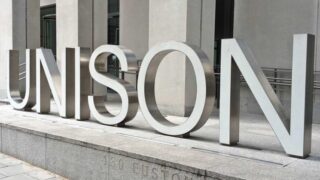The third day of UNISON’s national delegate conference, chaired by UNISON president Libby Nolan, saw delegates pass a composite motion in solidarity with Palestine – but not before several impassioned speeches were heard.
The debate came shortly after Palestinian ambassador to the UK Dr Hussam Zomlot’s speech to the union.
Introducing the motion on behalf of UNISON Scotland, Tony Slaven said: “After the deaths of nearly 40,000 people, a ceasefire is needed urgently.
“We continue to call for a ceasefire, for the release of all hostages, and for the release of thousands of Palestinians held in Israeli jails, often on trumped-up charges that render them political prisoners.”
He urged conference delegates to vote for the motion, which calls on the UK government to recognise Palestine as a state, to refuse to continue to supply arms to Israel and to support “a peace process that will outlive the politicians of today.”
Speaking in support of the motion, the chair of the NEC’s international committee Liz Wheatley said: “None of us will ever forget the sights and sounds coming out of Rafah. The sights of burning tents in a refugee camp where hundreds of thousands of people had been forced to flee as their homes across Gaza were destroyed.
“They were not displaced, they were driven there by a brutal bombing campaign that has seen over 37,000 killed, 85,000 injured and more than a million facing famine.”
Ms Wheatley’s speech focused on the second demand of the motion – to call on the UK government to suspend arms sales to Israel.
“Sunak and the Tories don’t care about that poor man holding up the headless body of his child, Ahmad Al-Najar; they don’t care about people burned to death in tents. They don’t care there are no hospitals to treat them, that people are starving because aid isn’t allowed in, because food and clean water is scarce. All they care about are their friends in the arms industry, who make a profit out of death.
“As a public-sector worker, I know that every penny, every pound that the government spends on death and destruction is a penny and a pound that could be spent on our hospitals, schools and our public services.”
Yvonne Green, speaking in support of the motion on behalf of Croydon local government branch, drew attention to the sixth part of the motion, affirming UNISON’s support for the boycott, divestment and sanctions (BDS) movement, which she described as “a peaceful method to pressure Israel to uphold international law”.
In a similar vein, Glen Williams from the North West region urged local government workers to take action on pension funds. “Local government pension funds invest £4.5billion in companies complicit in Israel’s oppression of Palestinians.”
Work on pensions is ongoing, having begun in 2015.
Delegates also spoke of the atrocities of 7 October, while the composite motion itself stated that “the horrific violations of international law committed by the Israeli government, Hamas and other armed groups in Gaza, Israel and the West Bank must be investigated and prosecuted by the International Criminal Court and the International Court of Justice”.
The motion was passed by a majority vote.
The motion calls on UNISON’s national executive council to:
1) Campaign for an immediate and permanent ceasefire; an end to the siege of Gaza including the full restoration of water, electricity and communications; immediate access to comprehensive humanitarian aid including food, water and medicines; and the safe release of both Israeli hostages, and Palestinians wrongfully held in Israeli prisons, including under administrative detention.
2) Call on the UK government to take measures to uphold international law, including suspending the arms trade with Israel, banning trade with the illegal settlements and supporting the prosecution of violations of international law by the International Criminal Court and International Court of Justice.
3) Call on the UK government to recognise Palestine as a sovereign, independent state, put pressure on the UN to recognise Palestine as a full member state and implement credible measures and call for renewed talks to facilitate an internationally supported, just political solution, in line with successive UN resolutions, which provides for a viable, contiguous Palestinian state, alongside Israel;
4) Work with Labour Link to secure a commitment from the next Labour government to recognise Palestine as an independent state.
5) Encourage branches to support the work of Medical Aid for Palestinians and the Red Cross to support the right to health, and make a further donation to Medical Aid for Palestinians.
6) Continue to oppose the UK government’s Economic Activities of Public Bodies (Overseas Matters) Bill and other attempts to restrict BDS, and continue to use targeted BDS to apply pressure to the Israeli government to end the occupation, respect the rights of Palestinians and bring about peace, including promoting UNISON’s campaign to divest from Local Government Pension Schemes to branches and regions.
7) Continue providing practical solidarity in support of the rights to decent work and quality public services, including through work with trade unions and Palestinian and Israeli human rights and workers organisations;
8) Encourage branches and members organising around Palestine in their workplaces and encourage them to mobilise for national and local peaceful protests.
9) Promote educational initiatives within UNISON branches to raise awareness about the history and complexities of the Palestine-Israel conflict.
10) Continue to support the work of the Palestine Solidarity Campaign and encourage regions and branches to affiliate.






